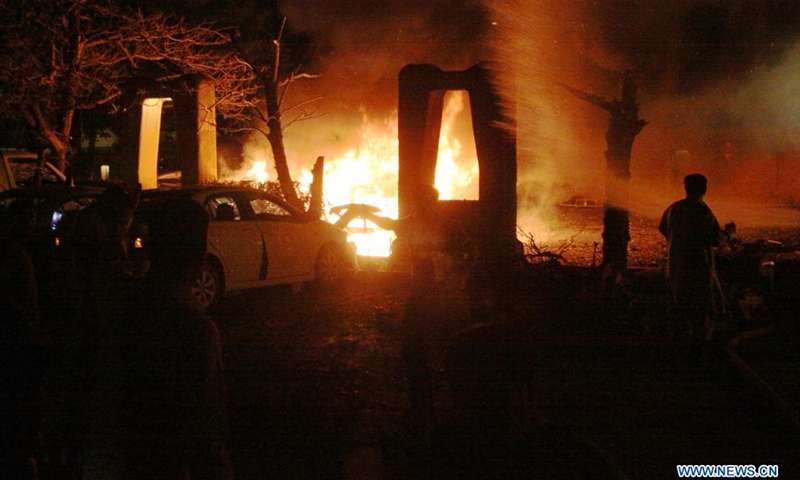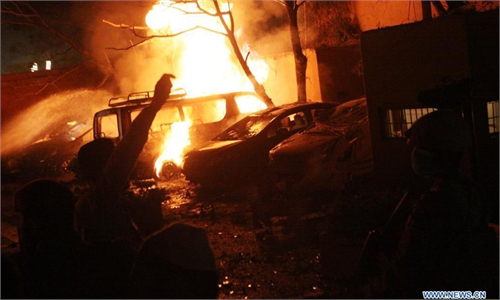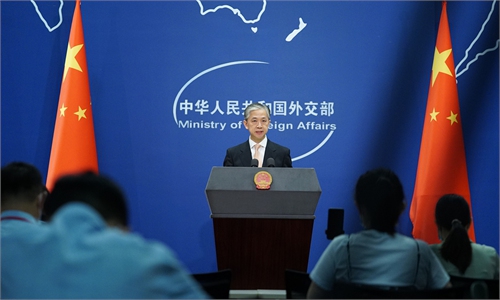
Fire breaks out at the blast site in Quetta, Pakistan's southwest Balochistan province, on April 21, 2021. Three people were killed and 11 others injured when a bomb went off inside the parking area of Serena hotel in Balochistan province Wednesday night, hospital sources said.(Photo: Xinhua)
At least four were killed and 12 injured on Wednesday night in an explosion in a hotel parking lot in Quetta, the capital of the province of Balochistan, Pakistan. The Pakistani government described this as "an act of terrorism." Pakistani authorities revealed that a Chinese delegation of around four people led by the ambassador was lodging in the hotel. But the ambassador was out for a meeting when the explosion took place. The Global Times has learned that all members of the Chinese delegation are safe and sound.The Pakistani Taliban, also known as Tehreek-e-Taliban Pakistan, claimed responsibility for the bombing. However, the target of the attacks remains unknown. Therefore, it is too early to conclude whether or not the Chinese Ambassador to Pakistan Nong Rong and his entourage were the targets of the terrorist attack.
Balochistan hosts many China-Pakistan Economic Corridor (CPEC) construction projects, with the Gwadar port being one of the best known. There have been previous attacks targeting Chinese businesses and personnel in the region. Western media is keen to create a narrative that locals are opposed to the China-proposed Belt and Road Initiative (BRI). But that is not the reality.
There are no political forces in Pakistan that clearly identify themselves as anti-China and anti-BRI. The overall attitude of Pakistani society toward China is friendly. The BRI is even more generally welcomed because it has boosted economic development, bringing about more jobs along the route. There are some specific disputes around the distribution of benefits. But they are of low intensity.
Terrorist attacks in Pakistan are mainly the result of the country's domestic contradictions. Most Chinese victims in those attacks have only occasionally been brought to these tragedies. And sometimes, attacks against Chinese in Pakistan were meant to embarrass the Pakistani government. Islamabad has done an effective job in countering terrorism in recent years, with a sharply reduced frequency of terror attacks. Nonetheless, as the CPEC construction advances, more Chinese people will go to Pakistan. The probability of them encountering a terror attack will increase accordingly. All these factors shape the basic security situation of the Chinese people in Pakistan.
Pakistan has made great efforts to protect Chinese people there. It is not an easy task for terrorists to make a huge fuss by attacking Chinese civilians. If the latest terror attack in Balochistan province was targeted at the Chinese ambassador to Pakistan, it undoubtedly failed. But if the attack was meant to something else, then it's another story.
Generally, the CPEC cannot and shouldn't be viewed as a risk project. But we still need to evaluate it rationally. It indeed may face some terrorist threats, but it is firmly secured in the political sphere.
Many countries that have signed up to the BRI don't have the ideal conditions in terms of political stability and security. Chinese enterprises' work there is, to some extent, risky. However, there is no safe and easy-to-get land of investment for Chinese companies, because markets of that ideal kind have already been occupied. Even if we don't take this kind of risk, we will still have to undertake other sorts of tests.
We can only be supportive to our brave compatriots who head toward uncertainties. They live in a place squeezed by Western forces. They have set up one pillar after another in places that Western forces do not think are worthwhile to go and where the Chinese economy can go. They also bring the businesses and investment of the Chinese people to the world. They are the driving forces of China's global integration.
From the bombing, we also understand the unusual risks Chinese diplomats face. They have to overcome the pandemic and face uncertainties brought about by extremism. Their job is not as elegant as some have assumed. China's rise is a tough journey, and Chinese diplomats shoulder the responsibilities of the country and the people.
Nothing comes easily, especially China's rise. No matter what difficulties we encounter, we should not easily say no. Going through and solving the problems is our mission.



